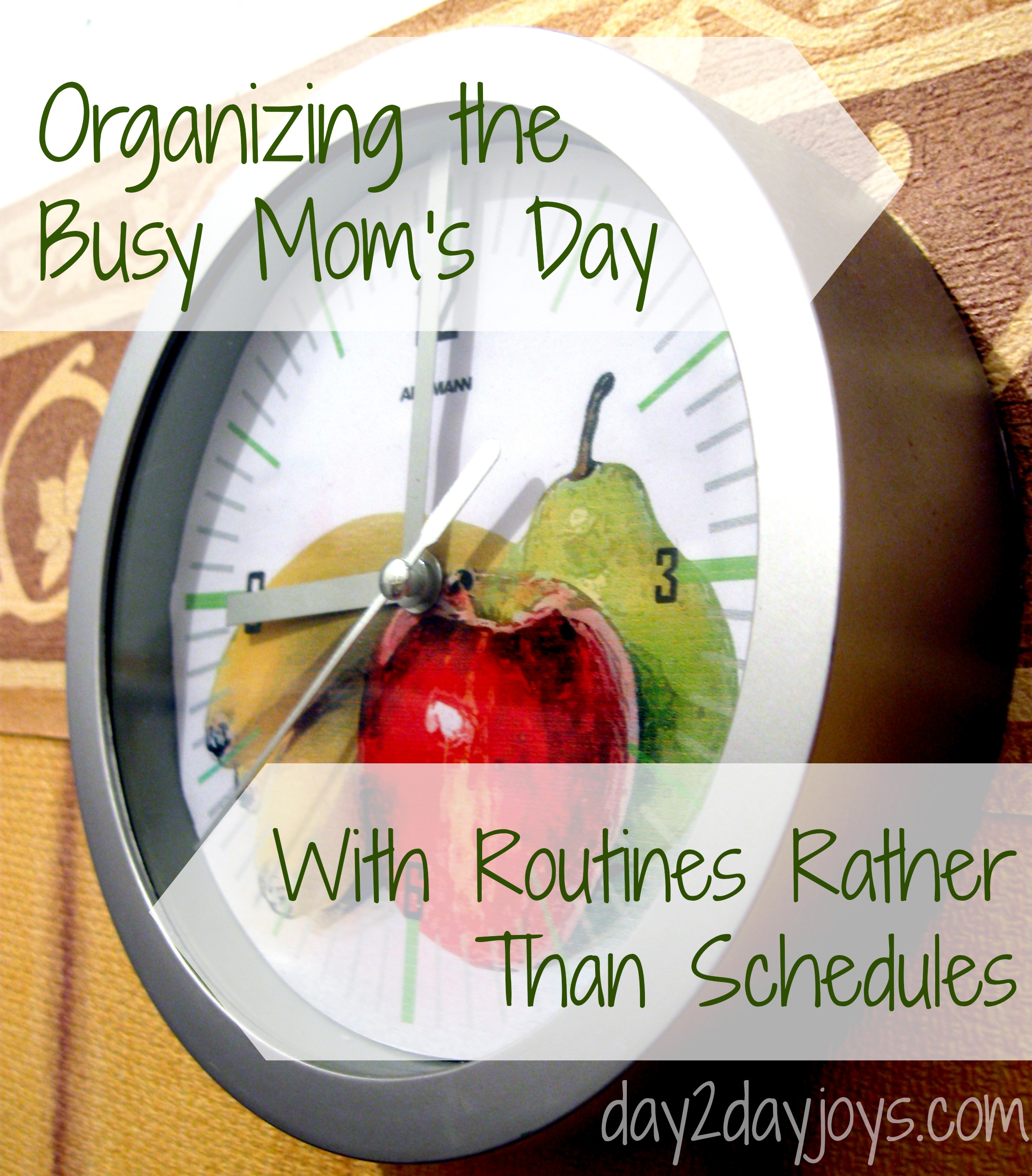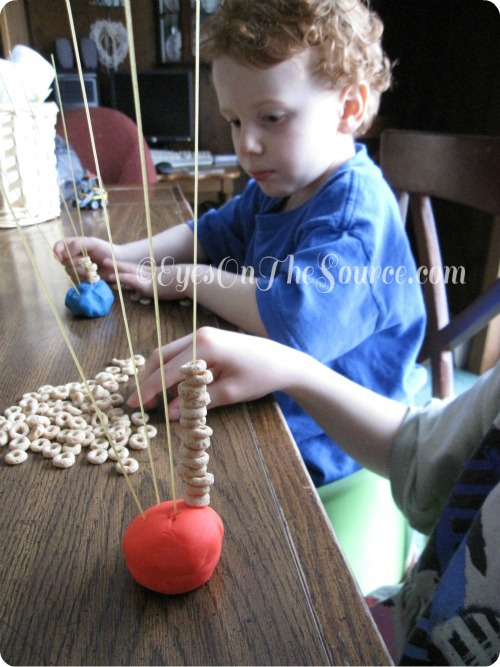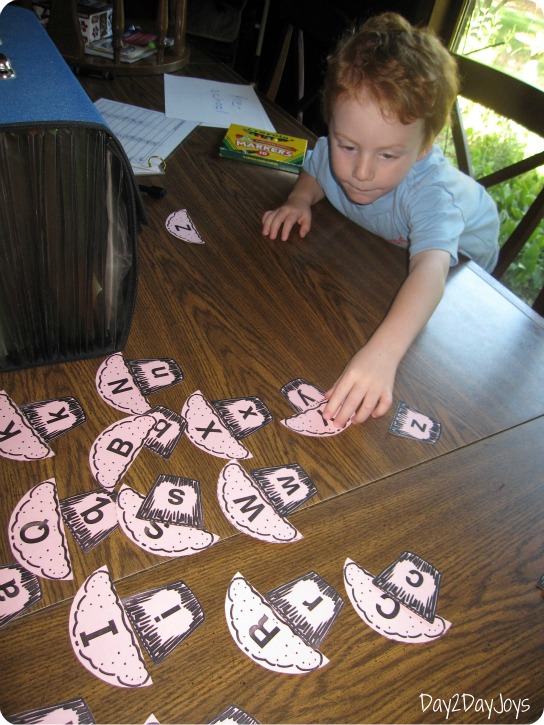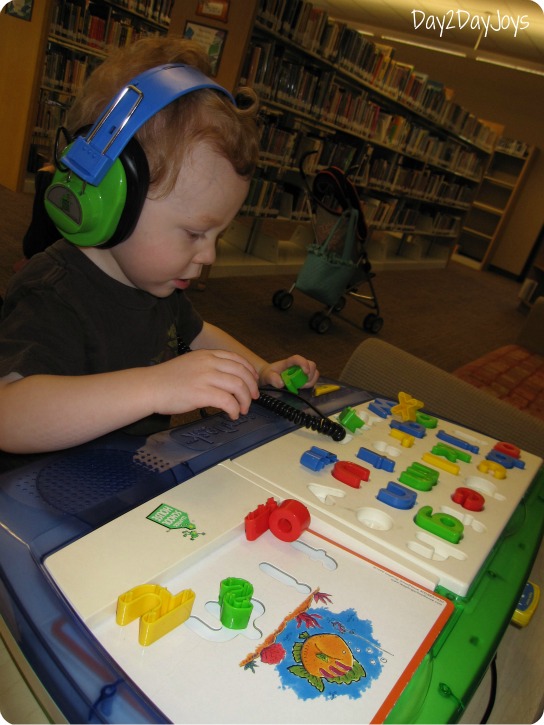The post 10 Tips for Setting Goals this New Year appeared first on Day2Day Joys.
]]>
Written by Karen @ To Work With My Hands, Contributing Writer
Setting Goals is probably practiced in January more than in any other month of the year. It’s a new beginning, and with it, we usually want to make positive changes in our lives and homes.
That’s a good thing! But, as with most things, setting goals is a learning process. Since I began setting goals, I’ve had some successes, some bumps, and some downright failures.
Here are 10 tips I’ve learned for setting goals for the New Year:
1.Keep it reasonable
One of the greatest culprits for goal failure is trying to do too much.
In my earliest attempts at goal setting, that’s exactly what I did. I started January excited, found February a little challenging, began slipping in March,and sometime during April, I totally lost steam. Just looking at my notebook lying on the shelf roused feelings of condemnation and failure.
I’ve learned that it’s far better to set fewer goals, reach them, then set new goals during the year, than to have a huge list that becomes overwhelming. Keep the goal list as a servant – not a taskmaster.
2. Make Your Goals Specific, Measurable, and Time-Sensitive
When you’re first getting started with goal-setting, it’s easy to set some ambiguous goals.
Goals such as: ‘be a better mom’, ‘learn to be more patient’, ‘spend more time reading the Bible’, or ‘do more for others’ are all simply too general.
These goals are so vague that it’s impossible to know when you’ve reached them.
For your goals to work for you they need to include 3 key elements:
- They must be specific. Instead of trying to be a better mom, set a goal to have a baking session with your daughter once per week, or to read through an adventure story with your son each month. These are specific, concrete goals.
- They must be measurable. If you can’t measure your goals, you won’t know when you’ve arrived. If you want to read through the Bible this year, set a goal of reading a certain portion each day and at the end of each day, you will easily know if you’ve made it.
- They must be time-sensitive. Without the gentle pressure of time, we can amble around, accomplishing very little toward our goals; they easily get pushed onto the “back burner”. Knowing exactly when your goals are due to be finished keeps you focused and on track.
Perhaps you want to write 4 notes of encouragement to friends by the end of the month. That goal is: specific (write notes), measurable (4), and time-sensitive (by the end of the month), and is much more concrete than “do more for others”.
3. Break Goals Down into Smaller Pieces
When you have a goal that can be broken down into smaller, bite-sized pieces, you’re much more likely to reach it. If your goals are specific, measurable, and time-sensitive, they are almost always easily broken down.
Looking at one of your annual goals, break it down into monthly bites, then weekly and daily bites. If you have a goal to declutter your house by the end of the year, you can tackle one room per month, working on books one week, clothes another week, and toys another, etc.
Or, you may choose to set a timer and devote a certain amount each day, jumping right in and tackling everything in the room at once. What you do specifically isn’t the most crucial point – finding what works for you in small pieces is.
4. Evaluate Regularly and Make Adjustments
Setting aside time each week, or at a minimum each month, to evaluate your progress is critical.
Keeping track of how you’re doing, and where you’re going next keeps the ball rolling.
While you’re evaluating, you may find that you need to make adjustments. When something unexpected comes along, you’ll probably need to adjust your goals. Maybe you need to shift the time of day you work on a particular goal. Maybe you need to devote more or less time to one.
Or, perhaps after giving it a fair shot, you realize your goal just isn’t a priority for you anymore and you choose to lay it down. Adjusting goals is perfectly reasonable, and I doubt very many goal setters have made it completely through a year without making adjustments.
5. Write Them Down and Keep Them Visible
It may seem like an insignificant thing, but having your goals visible can make or break your momentum.
We are all busy! It takes constant effort to keep the schedule in check and to make choices between the unreal number of options we have to choose from when spending our time.
If your goals don’t meet your eyes frequently, you will likely forget them!
Of course, to see them, they must be written down or typed out. Goals that are simply swirling around in your head are short-lived. Recording them makes them concrete.
6. Don’t Focus on Just One Area of Your Life
When setting goals, it’s easy to focus on a single area of life.
Just as in school, however, setting goals in a broader range of areas makes us better rounded.
Some areas to consider setting goals in are: personal (spiritual, physical, and mental), marriage, children, family, finance, business, education, and community.
7. When You Mess Up
There have been plenty of times in my efforts toward reaching goals that I’ve messed up.
I’ve dropped the ball, lost momentum, gotten off track when unexpected things happened,; and simply despaired because it was too overwhelming.
The most important thing to remember when you mess up is DON’T GIVE UP!
Find your place, make adjustments, and begin again. Any small step, no matter how small, is a step in the right direction. Keep moving and you’ll be making progress! Over time progress adds up.
8. Don’t Fall into the “To-Do” List Trap
Another easy trap to fall into when you beginning goal-setting is to add “to-do” items to your goals list.
While to-do’s have their place, they aren’t the same as goals and shouldn’t displace them. As a matter of fact, your goals will likely – and should – show up on your to-do lists!
There are so many things to accomplish every day and the list can get longer than we can practically manage in a hurry. Make sure you don’t set goals like weekly grocery shopping or taking the dog to the vet in February.
But, your goal of reading that book with your son can show up on Monday’s to-do list, by blocking out a specific amount of time to devote to it.
9. Forward Momentum Counts
If your goals are broken down well, it may seem that some are insignificant on a daily basis. That simply isn’t true.
If you set a goal to remove just one item that is no longer useful from your home each day, you will have removed 366 items by the end of this year!
Every step forward counts. As long as you aren’t falling backward, every step forward puts you closer to reaching your goal, even if you have to slow your pace along the way and perhaps adjust your ending date.
10. Keep Going by Setting New Goals
Reaching a goal is an exciting and exhilarating feeling! Once you reach one, however, it isn’t time to stop.
Are there other goals in the same area that you’d like to work toward? Maybe you had a very long list at the beginning that you knew was unattainable and chose to cut some items. Now you can add one of those back onto your list.
Setting and working toward goals is a learning process, just as working through them is, but the rewards you reap and the investment you make in your life and the lives of others are worth the effort. I set goals because I don’t want to simply tick off the days of my life, missing opportunities to grow and be a blessing to others. I hope you’ll be encouraged to set some this year too.
Here are a few of my favorite goal-setting resources:
The One Quality You Must Develop to Reach Your Goals
How to Change Your Life By Setting Goals
The 2 Most Powerful Words for Reaching Your Goals
The To Work With My Hands’ Setting Goals Series
How about you? Are you setting goals for 2016? Do you have more tips to add?
The post 10 Tips for Setting Goals this New Year appeared first on Day2Day Joys.
]]>The post 5 Ways to Stop Procrastinating and Get Things Done (in the future) appeared first on Day2Day Joys.
]]> Written by Christine @ So Domestically Challenged, contributing writer
Written by Christine @ So Domestically Challenged, contributing writer
A few weeks ago, I was invited by Rachel to be a contributor here on Day2DayJoys. I read her invitation. I got excited. I closed my email and made a mental note to get back to her…and I did get back to her a few days later.
She invited me to do a post. Immediately, at least 6 great ideas popped into my head. I was thrilled. I was energized. I was ready to go. But here I sit, in the last few hours before my first post is set to go live, and I have nothing. Those half-dozen great ideas have betrayed me: each one seemingly fantastic until I realized that I couldn’t find the words or it just wasn’t so interesting after all.
Here I am, a blank. I’ve spent days analyzing my life and motivations, reading notes I’ve written, mind-mapping, reviewing books, magazines, Pinterest…and nothing. Have I truly lost my mojo?
The truth. I turn my focus inward to look for reasoning. The truth, though I hate to admit it, is fear. I have procrastinated since day one because of fear. Not that I have any kind of real fear for my own well-being. No, my fear is distinctly first-world. My fear is of disappointing, failing, not being good enough. My fear makes me feel like a child, but is a fear I always tell my own children they have to push through.
The reality is that I procrastinate because I’m scared of failing and scared of the unknown. I figure this is an issue that probably faces a lot of us, so for my first post, my introduction to you, I’m going to share 5 ways to stop procrastinating and get things done (in the future).
5 Ways to Stop Procrastinating:
Commit
Saying “I’m going to do this later” or “I’ll have time after work on Thursday” are open-ended and set yourself up to keep moving the day or time you’re going to do something. Instead, make a “To Do List” every day, and write in how much time you’re committing to the task and when, just like an appointment: “I’m going to write my post from 5:45pm-6:30pm on Tuesday night”. Writing it down has the added bonus of somewhat tricking your brain into believing that the task absolutely has to be done at that time.
Reward Yourself
As I write this, I’m craving my three biggest vices: a cup of coffee, a coconut Outshine bar, and a book….okay, not a book. I want to play spider solitaire online. Guilty. I know that I’m going to enjoy doing those things a lot more when I don’t have anything else hanging over my head, stressing me out. I’m not going to allow myself any of those things until this post is complete! Not only does the reward give me something to look forward to, but it also takes away my ability to use any of those things to procrastinate: “I’m going to get back to working after this ice cream”. Bam! A two-fer.
Visualize the Future
This is actually something I do with my family and my Girl Scouts when they’re stressed and it works great for both long-term and short-term issues. Take a minute, relax, breathe and go through the steps of what is going to happen next. Work it out.
I’m going to keep typing.
I will get to the end of what I want to say.
I will read it back to myself.
I might hate it.
I will make sure it’s correct and of good quality.
I will submit it.
Some people might not like it.
I might be asked never to write again.
I will keep breathing. I will keep living.
Tomorrow, I will write about something else.
In a week, I won’t even think about it anymore.
Break a Job Into Tasks
Sometimes a job can seem stressful and overwhelming because it’s got several steps to it that don’t immediately sort themselves out in our minds. Try breaking a job down into various smaller tasks and write out a checklist. Even if you don’t have time to do an entire task, you can look at your list and get a few parts done.
For example:
Brainstorm talking points
Type up post
Review & edit
Format post
Add links
Take photos
Edit photos
Add photos to post
Submit post
Stop Being Your Worst Critic
Where did we all learn this? Every day is like one long Dove commercial, but instead of just criticizing the bags under my eyes or my flabby middle, I criticize my entire being: “I just did that because I’m an idiot” or “I could never understand that” or “I’m a terrible housekeeper” or “I wish I was better/smarter/more comfortable with myself”. Sometimes even confident-sounding statements to yourself can be undermining you: “I’m just going to fake it until I make it” or “I’ve still got it” or “I was great at that when I was younger”. All of these statements have an implied “there’s something wrong with me”. We send ourselves these constant messages that we are somehow less than our full potential, and worse than that, we quietly start believing it. Instead, make statements that are inherently true and non-objective.
I am a mother.
I am a wife.
I am a mentor.
I am a writer.
I am enough.
My words/actions/abilities are enough.
And they are all perfectly me.
Do you procrastinate? Why do you think you do it and what do you do to fight it?
The post 5 Ways to Stop Procrastinating and Get Things Done (in the future) appeared first on Day2Day Joys.
]]>The post 5 Tips For a Successful Homeschool Year appeared first on Day2Day Joys.
]]>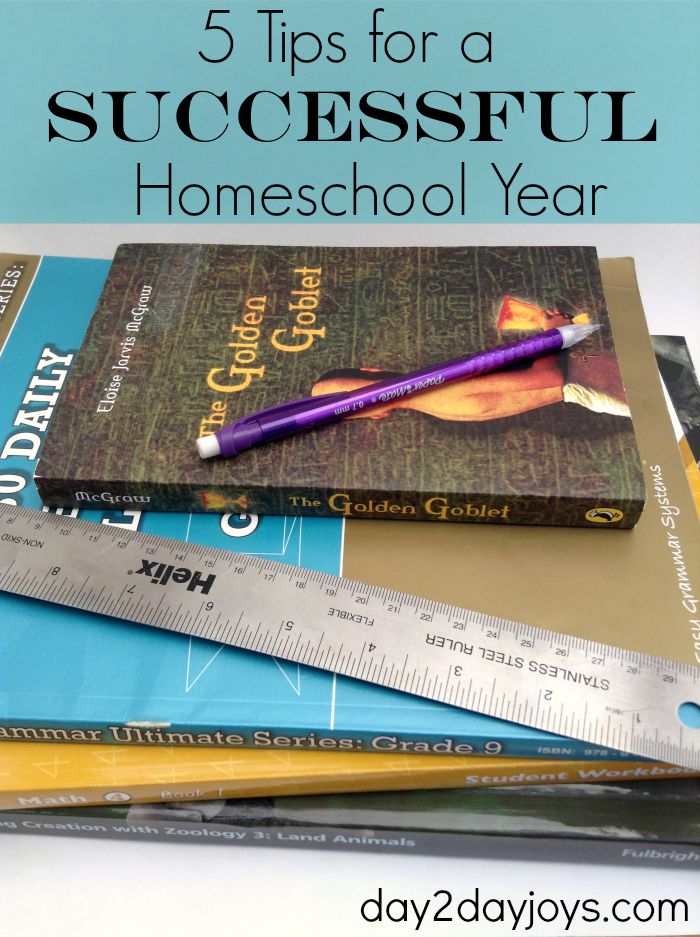
Written by Karen @ To Work With My Hands, Contributing Writer
Today is the first day of our new school year.
Today the books are out again, all fresh and crisp. Everyone is excited, and everything is new – for now.
But within a few weeks – maybe even days – the newness wears off and my children will wonder how they got duped by those pretty, crisp-covered books again. Sound familiar?
After 20 years of homeschooling, we still sometimes struggle. But along the way, I’ve learned a few ways to help minimize the struggle and keep ourselves from losing the joy of homeschooling.
1. Be Organized
Long before the first day begins, I’ve made plans. Beginning with curriculum choices and stocking up on school supplies, I also clean out our school cabinet and work areas. Some years lots of changes need to take place. Other years, just some tweaking is all that is required.
Next, I create a schedule for the year. Looking at what needs to be accomplished by each child during the year, I break those goals down into monthly, then weekly bites.
2. Clear Expectations
Just because I know where we are going, doesn’t mean that the children necessarily do. In an effort to help them own their work, I let them know what the plan is for the year.
The older boys appreciate knowing exactly what they need to accomplish for the year and can more easily plan their study hours around outside activities.
The younger children get weekly goal lists that help them stay on track with their independent work, and to know what is coming up in the subjects we study together. They can see a clear path and have an understanding of what it will take for them to finish for the week.
3. Rewards
Through the years we have sometimes used rewards. At other times, we haven’t. Our children known that schoolwork is simply a part of their lives, and we don’t give prizes for getting it done. However, there have been times that we found it helpful for them and for us to positively encourage them along.
When we have a particularly trying subject, hit a difficult time in personal motivation with one child or another, or even have family events that compromise our normal school schedule, we have used incentives to help make the work more rewarding.
Let’s face it. If you’re 7 years old, it’s hard to see the long-term benefit of learning math facts day after day, especially when the going gets tough.
Since our younger children struggled last year with getting their independent work finished without lots of pushing, this year we’re giving them the opportunity to earn a point each week when it’s finished early. Work finished on time is expected, but finishing before it’s expected will be rewarded.
Following the idea our library uses each summer during the summer reading program (which my children just completed and thrived in this point-earning system), the children will be able to save up earned points and cash them in for special activities that they enjoy.
4. Shake Things Up
I’m a routine/schedule/stay-on-track kind of mom, but realize that although routine provides stability, know that it can also produce boredom – especially in children who are wired differently.
Having a solid routine in place works well for most days, but I’ve found that when I throw in a change of pace every now and then, they’re better energized for the more typical days.
Packing up the books and spending a day at the park, enjoying a field trip without the books, taking a day to watch DVD’s on our current science or history topics, or just taking a day off on that first crisp morning after a scorching summer to take a hike or bike ride can all be ways to recharge the batteries by getting out of the routine for a day.
5. Margin
If there’s one thing that I continually struggle with – even after so many years of homeschooling – its margin.
There’s so many wonderful things to do, so many exciting things to study, so much to learn. It’s way too easy to over schedule, over plan, and overdo.
Learning to shorten my personal to-do list each day is also spilling over into the school to-do list. There simply isn’t enough time to do everything and when I try to cram it all in, we lose margin. When the unexpected happens – and it will – the whole cart gets upturned.
The answer is to under schedule. If we can accomplish 5 days of science each week, I’ll only plan for 3. If we get the extra 2 days in, that’s great. If we don’t, that’s okay and we aren’t falling behind.
Leaving room for the unplanned and for just having breathing room is essential for making it through the year without hitting the February slump and getting burned out or feeling like we didn’t quite make it.
If your homeschool runs anything like ours, the first week can be pretty exhausting. Even after all of these years, and relatively short summer breaks, I still marvel at how much change is generated when we get back to school.
But with a few tactics in place, it can be a rewarding week that is just the first step toward a productive and enjoyable year. And when we look back at all that we will have accomplished next spring, I’ll be armed with knowledge to make the next years even better.
What are your tips for a successful homeschool year?
The post 5 Tips For a Successful Homeschool Year appeared first on Day2Day Joys.
]]>The post Day Hiking with Kids appeared first on Day2Day Joys.
]]>One of our family’s favorite things to do together is to get out in the woods and explore. Sometimes we venture farther off into the mountains or state parks, other times we keep closer to our home and stick to nearby environmental centers and local parks.
It’s a free and fun, and a great source of exercise for all of us.
There are times when fatigue or forgetfulness make me prefer the comfort and ease of staying home, but inevitably, as soon as we are outdoors together, I quickly remember why the effort is worth it and how special these times are.
Being outside, exploring nature, testing their physical strength, learning from observation– getting your kids outdoors is one of the best things you can do for them this summer.
And doing it together is important too. Your children will pick up on your enthusiasm and sense of the worth of being in nature.
You don’t need to take a lot with you when you are going out for a simple day hike with your kids, but there are a few things you want to be sure not to leave behind.
Here is are 5 items that always make it into our bags when we head off onto a trail:
1. Water
Obviously a hiking necessity. A bottle for everyone makes it easier to keep track of how much everyone is drinking and can help motivate younger children to stay hydrated. Don’t skimp on water breaks– rather, make it a point to take them together and see that your kids are taking drinks too.
2. An energy boosting and filling snack
Hiking can be physically strenuous and at some point you are going to need to replenish your energy with a good snack. A good snack is especially helpful for children who don’t typically have the stamina of adults and who would benefit from taking a short rest to eat. Granola bars with protein, nut butter balls, apples, oranges, a bag of seeds and nuts, sliced cheese and so on give everyone the fuel they need to complete a hike.
3. Bug repellant and bite cream
We don’t actually use much bug repellant, but if your family is prone to insect bites, this is good to have on hand. A little lavender essential oil or Hyland’s Bug Bite Ointment is also good to tuck into your bag in case of itchy, irritating bites someone gets along the hike.
4. Two diapers and a small amount of wipes. (If a baby is attending the hike)
This is one instance where you don’t need to overpack “just in case”. Bring what you need for one or two changes while you are out. If something requiring more happened, it may be time to call it a day.
5. Small backpacks or bags for the kids
Children old enough to carry them should be encouraged to take along a small bag to hold their water and treasures that they find along the hike. Small rocks, neat leaves or feathers, a cool looking stick– these can all be great mementos to bring home to continue talking about your hike.
Help them to resist the temptation overpack their bag before starting out. Keep it light and they will be more likely to succeed in carrying it themselves.
A few more items that are sometimes good to have on hand:
1. Sunscreen
If you are hiking out in the sun or plan to stop and play in the water, apply sunscreen before you start and take along a small tube for reapplications as needed. Here’s a great DIY Sunscreen!
2. A map and compass
Most trails are well marked and maps aren’t often necessary.
3. Baby carriers
Depending on the ages of your children, a good baby carrier (or two!) might be a lifesaver. We love our backpack style carrier for young babies (perfect for naps on the trail) and our framed backpack carrier which is better for toddlers who can’t walk long distances on a trail but want to be a part of the experience.
What is your family’s favorite outdoor activity?
The post Day Hiking with Kids appeared first on Day2Day Joys.
]]>The post 5 Things You Can Do to Get Your Garden Growing appeared first on Day2Day Joys.
]]>
Written by KT @ One Organic Mama, Contributing Writer
It’s been a LONG winter here in Central MA. We had over 100 inches of snow, and the remnants of it still remain in my yard and covering my garden. It has been 50 degrees the past few days, yet still we have about 1 foot of lingering snow/ice/sand/yuck. The kids think it’s summer, they are running around with water guns, riding their bikes in the driveway, and splashing in the mud. I am focusing on getting the garden going – despite the fact that I cannot plant anything outside just yet.
Hopefully you’re somewhere, anywhere just south of here  and you can get outside and make this happen!
and you can get outside and make this happen!
Here are 5 EASY tips to get your garden growing this spring…
So you can enjoy veggies well into the fall. 
1. Map out your garden and turn the soil over
Clearly, in my house, this is a job for all the boys who outnumber me  The soil needs to be ready to accept all your seeds or small plants – so head out there and start raking with a metal rake. If you compost, now is the time to put that rich, nutrient filled, dirt into the mix. If you don’t – mix in a little organic fertilizer. Planning where to put your garden is important. Think of where we buy all our veggies from… FL, CA, South America… you need a spot that is FULL OF SUN for pretty much the whole day. You don’t need a big spot – but it needs to have BIG sun. You need a spot that you can get water to… don’t pick a place you can’t reach a hose/sprinkler. You need a spot that you are going to protect from animals… don’t pick your dog’s favorite play area!
The soil needs to be ready to accept all your seeds or small plants – so head out there and start raking with a metal rake. If you compost, now is the time to put that rich, nutrient filled, dirt into the mix. If you don’t – mix in a little organic fertilizer. Planning where to put your garden is important. Think of where we buy all our veggies from… FL, CA, South America… you need a spot that is FULL OF SUN for pretty much the whole day. You don’t need a big spot – but it needs to have BIG sun. You need a spot that you can get water to… don’t pick a place you can’t reach a hose/sprinkler. You need a spot that you are going to protect from animals… don’t pick your dog’s favorite play area!
2. Start your seeds
Sometimes it’s warm enough outside to just put your seeds right into the ground… this year that is not the case for me. We start our seeds in seed trays, cover them with plastic lids, and put them on our (old, steam) heaters around the house right by the windows. Make sure to label your rows – because when things start sprouting you don’t want to forget what is in there! If you’re a first timer – just start with a few things… tomatoes, cucumbers, herbs, and any kind of squash are all pretty easily grown from seed.
When your cucumbers and tomatoes start to sprout, use toothpicks or skewers to keep the plants standing and not drooping all over the tray. Plant the squash around the outside of the trays so that it can crawl down the sides.
3. Surround your space with plants pests hate
Do a little research about what pests are common to your area. Then find flowers those pests don’t love. Surround your garden with those flowers. Marigolds and petunias are common ones – but look into your climate range and see what might work for you. This has been instrumental in our ability to garden naturally. It also makes your garden look pretty awesome!!!
Once you have your flowers in place, and it is nice and warm out, start transplanting your little seedlings from the heater into the garden. Put tall things in the back and shorter things in the front. Make sure to space things far enough apart that you can get to each plant – even when they get HUGE!
4. Mix up some natural pest control
Mix up some Neem Oil Spray! This works for almost everything (in my area). Neem oil smells like old potatoes and onions  If you mix up a teaspoon or two with some warm water and a drop of non-toxic soap – you are ready to attack any little buggies that want to stop you from having fresh veggies this summer! Get the recipe here.
If you mix up a teaspoon or two with some warm water and a drop of non-toxic soap – you are ready to attack any little buggies that want to stop you from having fresh veggies this summer! Get the recipe here.
5. All you need is love… and sun and water
After your garden is planted visit it. Sit by it. Love it. Head outside a few times a day to check things. Is the soil too dry? have critters crossed your flower barrier? are there bugs that need to be dealt with? Most garden problems are easily googled and dealt with – but the sooner the better. You don’t want a full garden aphid infestation – but if caught early – it is no big deal – I promise!!
How do you get your garden ready? What are you growing this year?
The post 5 Things You Can Do to Get Your Garden Growing appeared first on Day2Day Joys.
]]>The post Tips for eating healthy appeared first on Day2Day Joys.
]]>
Written by Christy @ Fresh Mix Momma, Contributing Writer
Many people are looking to eat healthier these days. It seems like there is a common misconception that it is hard to eat healthy or too expensive.
When I look at how my husband use to eat compared to now, I am shocked. Over the past few years we have pretty much completely changed our eating habits for the better. The best part about this change is, for us, it really wasn’t a hard change.
Over the past few years we have just taken different tips for eating healthy and incorporated it in our lives. Over time these tips became habits.
If you are looking to eat healthier here are some of my tips for eating healthy:
Shop the perimeter of the store
This tips could quite possibly be one of the most important and life changing tips. When you shop the perimeter of the store you are buying more fresh food. This can also save you a lot of time, since you aren’t wandering up and down all the isles. Of course there will be times when you need something down an isle, but just try to stick to the outside.
Meal Plan
Take time to sit down and make up a meal plan. This will help out with your shopping, keep you on track and probably save you some money (you are less likely to impulse buy junk food.) There are plenty of healthy meals available on Pinterest that can make meal planning a cinch. You can check out my Healthy Meals boards on Pinterest, if you are looking for a place to start.
Meal Prep
Once you have all your food together, try to take a day or so to meal prep for the week. This will help you stay on track and not fall into the “I don’t feel like cooking, let’s just eat out.”
Use smaller plates
One of my problems in the past wasn’t because I didn’t eat somewhat healthy foods, it was that my proportions were way out of control! Using smaller plates can help control your proportions.
Eat Real Foods
I think one mistake many people make is that they eat what they believe are healthy foods, but might not be as healthy as they realize. Try your best to stick with real foods. Real Foods are not processed, they are natural and quite delicious and filling. You will find that the more whole foods that you eat, the less you crave all the processed, sugary foods.
Treat yourself
That’s right, I said Treat yourself! Eating healthy is great, but we all need treats every once in awhile. You can even make your treats a little healthier as well. Fruits are delicious and packed with natural sugars for your sweet tooth. If you are a chocolate lover, try some dark chocolate! Treats every now and then are sometime essential, just be sure to keep the treats under control.
If you are looking for a healthier diet, try to follow these simple tips in your life and you will see change over time. Eating healthy doesn’t have to be hard, but it can take some time. Make it a lifestyle change and before you know it these simple tips will be habits in your day to day life!
What healthy tips have helped you? Do you have any to add to this list?
The post Tips for eating healthy appeared first on Day2Day Joys.
]]>The post 5 Homeschool Tips for Wiggly Kids appeared first on Day2Day Joys.
]]>Here we are half-way through the school year. Cooler weather can make the days seem longer as the kids can’t always get outside to run off their excessive amounts of energy. The excitement of the new homeschool year has worn off by now and we’re all ready for something new in the New Year!
After a couple weeks off from school and many routine busting holiday events, late nights and cookies galore…it’s been hard to get back on track around here. Everyone seems more wiggly and distracted…myself included!  So we’ve had to do a little brainstorming on how to get our groove back.
So we’ve had to do a little brainstorming on how to get our groove back.
Here are a few ideas that have been working for us…
1. Start Your Day With a Family Dance Party/Workout
You gotta shake, shake, shake, the sillies out! As none of us in my home are morning people, it takes a bit to get our brain power activated. So, some fancy dance moves and yoga stretching are a great way to wake up our minds and bodies. Or maybe if that get your little ones TOO SILLY,  save it for the mid-morning or afternoon slump to get the blood pumping again.
save it for the mid-morning or afternoon slump to get the blood pumping again.
2. Hand Fidgets
I’ve heard it said before that our minds are only as active as our bodies. That sure seems to be true with my boys. If I want them to actually listen to me while I read or teach them something, it works best to give them something that will keep their hands busy. And sometimes it takes more that just their hands being busy. An exercise ball or a mini-trampoline can really come in handy while chanting multiplication tables or reciting memory verses!
Some hand fidget suggestions: Pipe Cleaners, Nuts and Bolts, Links, Dollar Store Items, Legos, Rubix Cube, etc.
3. Get Outside
If even just for a few short minutes, a breath of fresh air can be…well, a breath of fresh air!  Even for myself when my mind goes cloudy or I am feeling frustrated, getting out of the house clears my head a lot and quickly, too! If you can’t get outside, check out these indoor winter games for kids…
Even for myself when my mind goes cloudy or I am feeling frustrated, getting out of the house clears my head a lot and quickly, too! If you can’t get outside, check out these indoor winter games for kids…
4. Let Them Choose
Is there any reason that Math has to be first thing on the schedule? If it’s practical, why not let your children choose what comes first on the agenda once in a while. They may show more interest if it is the subject that they have chosen themselves.
5. Change Of Scenery
Make it fun! Working/studying in a different area of your home (or not at home!) can inspire more interest in learning as well. Set up a fort, throw a blanket under a tree, snuggle up by the fire or in a big bed, take a field trip, head to the library.
Some days are better than others! Don’t force it or it becomes miserable for everyone! Just enjoy being together as a family!
What does your family do to inspire and encourage learning?
The post 5 Homeschool Tips for Wiggly Kids appeared first on Day2Day Joys.
]]>The post Tips for treating a cold without medicine appeared first on Day2Day Joys.
]]>
Written by Christy @ Fresh Mix Momma, Contributing Writer
Hello 2015! It’s nice to meet you!
Although I love to meet a bright and shining New Year, I am not thrilled with the cold & flu season that seems to come with it!
Just like many others, I had recently come down with a nasty cold. Of course, just my luck it was the same day my husband went back to work, leaving just me & my little one (isn’t that the way it always goes?)
I will be the first one to tell you, I can’t stand taking medicine! I can take a good multivitamin with no problem, but I just don’t like medicine. I feel like most the time over the counter medicines just mask the problem for a little bit and don’t actually help treat the issue. I also pretty much refuse to go to the doctors unless I absolutely have to.
So, what do I do when I get sick?
On the rare occasions that I do get sick, there are always a few things that I do to knock out my cold quickly.
Here are my tips for treating a cold without medicine:
1. Rest
I know this one can be hard, since we are all busy, but it is very important to try and get as much rest as you can.
2. Water, Water, Water
You need to be sure to keep your body hydrated when you aren’t feeling well. As much as you might want that Tea, Gatorade or Sprite nothing will help hydrate you better than just plain ol’ H2O!
3. Steam it up!
This is one of my first go to tricks whenever I feel like a cold may be coming on. I steam up the bathroom and just go in, relax and breath in the steam. Not only can a steamed room be nice and relaxing, but by inhaling the steam it can help you breath better and loosen any congestion you might have.
4. Take your Vitamins
Taking a good multivitamin can do wonders! Many times when you aren’t feeling well, you don’t feel like eating very much so much sure that your body is getting extra vitamins that it needs. Taking in some extra Vitamin C doesn’t hurt either. Rachel recommends these women’s multi’s.
5. Tea with honey please!
Another go to for me is drinking some Green Tea with honey. Although, I am normally a coffee person, when I am not feeling well I go straight for the hot tea. Drinking hot tea will help open you up as well as loosen congestion. The honey can help soothe a sore throat and adds a little extra sweetness (added bonus!)
I hope that these tips help you, if you are feeling under the weather. Here’s to a healthy & Happy New Year!
What are some natural ways that you treat a cold?
The post Tips for treating a cold without medicine appeared first on Day2Day Joys.
]]>The post Finding Harmony and Productivity for the Work-At-Home-Mama appeared first on Day2Day Joys.
]]> Written by Karli @ Feed Me Mama, Contributing Writer
Written by Karli @ Feed Me Mama, Contributing Writer
More and more mothers are turning to working from home in order to maintain the family budget but still stay home with their children. Whether it’s working for a network marketing company or hand making goods for an Etsy store, mamas across the country are finding ways to be home with their little ones- but it’s not always easy!
I am one such mama, and I am here to tell you- it is NOT all rainbows and butterflies and paychecks here in Work-At-Home-Mamaland. It is quite possibly the most difficult and taxing thing I’ve ever taken on- but it has been so worth it.
Today, I want to share with you some of my top tips for increasing productivity and joy as a work-at-home-mama! I hope that integrating these attitudes and routines graciously into your family will be as much of a blessing to you as it has been to me.
Top tips for increasing productivity and joy as a work-at-home-mama:
Make a priority list
It has been paramount to finding harmony within my home for me to really, honestly decide what my priorities are in my life. Once I declared that my daughter and her happiness and development were more important than my business, that helped me make daily decisions about where to spend my time. I have a written list of my priorities in my office, and it has really helped me focus on what matters most.
Take strategic planning retreats
Once a month, or perhaps once a quarter, carve out an afternoon or a day to plan your next weeks/months out ahead of time. Consider big events and goals that you will need to attend to, and things that may distract you from them as well. Being prepared will help make your day-to-day life run more smoothly.
Set measurable and attainable goals
This is key to feeling successful and keeping yourself motivated! Whether it’s a certain number of sales, a rank advancement, a number of blog posts, or releasing a new product, set goals for yourself. Then, break that goal into smaller goals! In our house, we ask: how do you eat an elephant? One bite at a time… 
Set business hours.
This is another really important part of being a wahm. For you, setting aside business hours might mean hiring a babysitter for a few evenings a week or asking a friend to watch your kids in the mornings. Like me, it could mean that your business hours are simply “naptime”….whatever that looks like for that day! You can be as flexible or structured as you need to be, depending on your schedule and priorities, but having these set hours enables you to turn off “work mode” and focus on family during the other parts of the week, and truly be present with them!
Look for “harmony” rather than “balance”.
Work and life balance is a buzz phrase these days, but I want to challenge you to take it further- prayerfully find harmony in integrating your work into your family. If your kids can help you stuff the pillows you are sewing, or your husband can help you talk through a business proposal, let them! Seek to let everything you do be done out of love.
Be willing to throw it all out the window.
One of the most important traits of the happy and successful wahm is the ability to be gracious with herself. Some days, business just doesn’t happen because family and homemaking need to come first. And that’s okay! We are blessed to be able to make those decisions.
Do you work from within your home? What steps do you take to increase productivity and also be present with your family?
The post Finding Harmony and Productivity for the Work-At-Home-Mama appeared first on Day2Day Joys.
]]>


